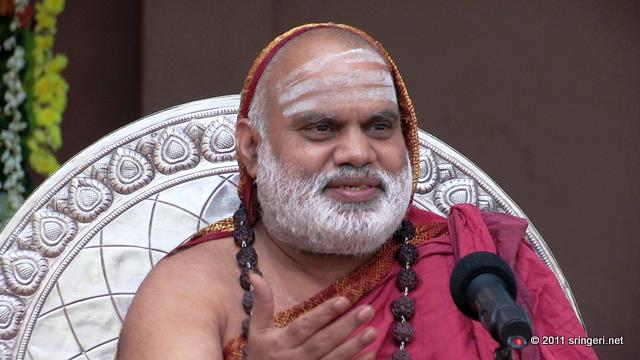Samskritotsava Celebrated

Samskritotsava was observed by the staff and students of the Rajiv Gandhi Kendriya Samskrita Vidya Peetham at Sringeri on 14th August 2011. The inauguration was held at Guru Nivas with Jagadguru Shankaracharya Sri Sri Bharati Tirtha Mahaswamiji lighting the lamp. Prof. Vempati Kutumba Shastry, Principal of the Vidya Peetham welcomed the gathering.
In His Sanskrit Anugraha Bhashanam, the Jagadguru expressed happiness at the event and stated all that it is an occasion to remind oneself of the greatness of Sanskrit, increase one’s Shraddha towards it and its propagation.
There was a time when Sanskrit reigned as the primary language of communication. A shloka in the Naishadeeya Kavya of SriHarsha (from the 12th century) depicts it beautifully –
अन्योन्यभावानवबोधभीत्या संस्कृत्रिमाभिर्व्यवहारवत्सु ।
दिग्भ्यः समतेषु नृपेषु तेषु सौवर्गवर्गो न जनैरचिह्नि ॥
During the Swayamvara of Damayanti, kings from various parts of the earth as well as the devas assembled. However the citizens who had come to witness the Swayamvara were unable to differentiate between the earthly kings and the devas. This was because the kings hailing from different regions used Sanskrit as their language of communication so that everyone could understand each other. The Devas too of course spoke in Sanskrit. Such was the extent of the usage of Sanskrit.
We also find that Scholars from various parts of Bharata Varsha used only Sanskrit – be it Panditaraja Jagannatha or Annambhatta from Andhra, Appayya Deekshita or Dharmaraja Adhvarin from Dravida desha (Tamil Nadu), Bhattoji Deekshita or Nagesha Bhat from Maharashtra, Gangeshopadhyaya or Vachaspati Mishra from Mithila, Kshemendra or Abhinava Gupta from Kashmir. They used Sanskrit because only then could their works reach everyone. Sri Adi Shankara Bhagavatpada hailed from Kerala but wrote all His works in Sanskrit.
Today, many feel that Sanskrit is a language of a select few, and have come to accept a foreign language as our language of communciation. However it is essential for those of us who have disregarded Sanskrit to realise the importance of the language and take up its study.
The Jagadguru earlier released a book called “Vakyartha Bharati” containing expositions on topics in the Shastras. The congregation ended with the Jagadguru blessing the students and faculty.
